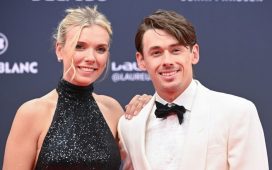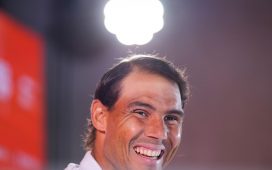The longest grand slam tournament in tennis history is finally at an end. The Australian Open, which truly began more than five weeks ago when the first players strode on to their airplanes to Australia before their quarantine period, ended on Sunday with the familiar sight of Naomi Osaka and Novak Djokovic on top of the world.
On Monday Djokovic gave further details about what it took to win his 18th grand slam title. After previously confirming a tear in his right oblique abdominal muscle, he said his post-tournament MRI indicated the tear grew from 17mm to 25mm.
Djokovic may have offered himself up for criticism numerous times over the past six months, but this is not one of them. He was cruising at two sets up in his third-round match against Taylor Fritz when he clearly slipped and immediately took a medical timeout before he escaped in a fifth set. The idea that he would deliberately complicate an easy match and then skip practice for an entire week for dramatic effect is nonsensical.
What Djokovic demonstrated on the court is a lesson learned from all of the great players of this time. You do not win 18 grand slam titles only in perfect conditions. The greats have all dramatically won through injuries, illness and personal problems. It is deeply impressive and he deserves credit for his success.
The two weeks provided further nuggets of interest for the season ahead. With all of his trickery and athleticism, Daniil Medvedev is a clear contender for years to come and he now stands just 115 points in the rankings from the world No 2 Rafael Nadal. For Nadal his nerve, and his conditioning because of a back injury, cost him as he lost against Stefanos Tsitsipas in the quarter-finals from two sets up. His level remains extremely high on hard courts, but the eternal question is whether he can stay healthy. Tsitsipas, meanwhile, continues his steady progress.
The semi-final run from the 27-year-old Russian qualifier Aslan Karatsev further underlines the amount of depth in both tours – many players are simply yet to find the right environment to thrive. Conversely, it is clear that Nick Kyrgios can perform on the big stage regardless of circumstance. On this rollercoaster ride, 11 months after his last matches, he recovered from match point down against Ugo Humbert and then lost against the third seed Dominic Thiem after leading by two sets. He will not resurface for some time, but it will be hard to miss him when he does.
In the women’s game, Osaka has already established an all-time great hard-court grand slam resume but now her focus turns to increased consistency and the other surfaces. It will take time and those expecting her to tear through both Roland Garros and Wimbledon are likely to be disappointed. Her opponent in the semi-final, Serena Williams, ousted the top-eight seeds Aryna Sabalenka and Simona Halep. At 39 years old her level of play is still wonderful but in order to win again she will have to relearn how to rise for the biggest matches when it counts.
The Roland Garros champion Iga Swiatek, exactly 20 years younger than Williams, spoke of her doubts before the tournament but she performed extremely well, losing in the fourth round against a resolute Simona Halep. Earlier that day, Garbiñe Muguruza played a brilliant match against Osaka. Although unable to close it out, she is thriving with Conchita Martínez as her coach and she will be a nuisance this year. With the returns of Bianca Andreescu and Ashleigh Barty, it is clear that women’s tennis is flourishing and the hope is they will, too.
In the end the Tennis Australia chief executive, Craig Tiley, and his team impressively navigated an endless series of complications to ensure the safe production of the event. In an interview with AAP, Tiley detailed the personal impact, which ranged from sleep deprivation to the “significant” abuse he received from players during their virtual meetings each day. The event wiped out A$80m from their reserves.
Sign up to The Recap, our weekly email of editors’ picks.
What they produced was a gripping sporting event that played out in the final days to the warm, familiar sound of booming crowds. Tiley had suggested that not hosting the event this year could have eventually led to it moving to China or elsewhere in Asia, despite the fact that Asian events had already been cancelled, and on Sunday he said that the “global message” the tournament sent was valuable enough.
Neither reason convinced, particularly now that global message includes the boos from fans after the TA chair, Jayne Hrdlicka, simply mentioned vaccinations during her speech. It was all a blast, but we will not learn for some time whether it was enough.







